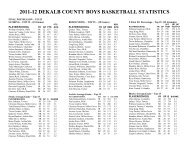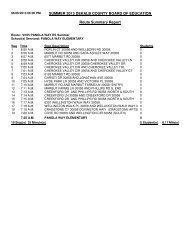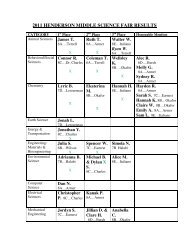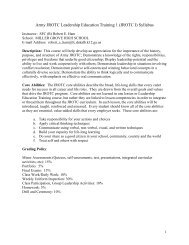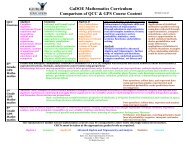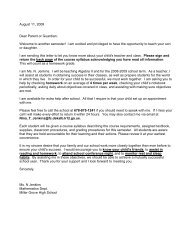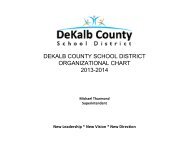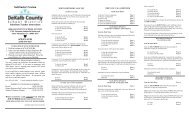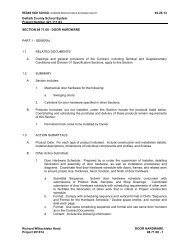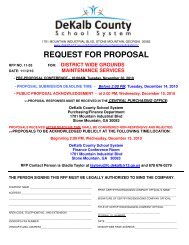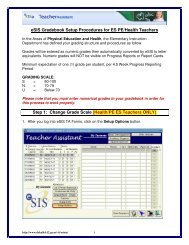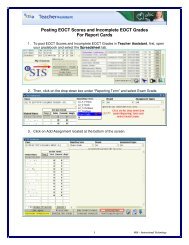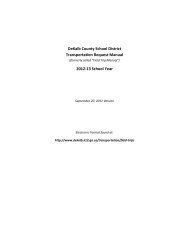GEORGIA HIGH SCHOOL ASSOCIATION - DeKalb County Schools
GEORGIA HIGH SCHOOL ASSOCIATION - DeKalb County Schools
GEORGIA HIGH SCHOOL ASSOCIATION - DeKalb County Schools
Create successful ePaper yourself
Turn your PDF publications into a flip-book with our unique Google optimized e-Paper software.
<strong>GEORGIA</strong> <strong>HIGH</strong> <strong>SCHOOL</strong> <strong>ASSOCIATION</strong> 21<br />
(d) When a military base is located in two school districts, a student moving onto the base for the first time<br />
may choose to attend either school district, and that district will place the student appropriately. Any<br />
transfer after the initial move will be subject to standard eligibility regulations.<br />
1.68 Hardship Applications may be filed to attempt to establish eligibility in the following situations:<br />
(a) A student who changes schools because of a temporary custody transfer from a parent to a guardian,<br />
or from one guardian to another (See Article IV, Section 5, in the GHSA Constitution).<br />
(b) A student whose transfer is based upon his being emancipated, homeless, a child from a broken home,<br />
a ward of the DFACS, or a ward of a Court (See Article IV, Section 5, in the GHSA Constitution).<br />
(c) In order for a hardship appeal based on a financial hardship to be approved, the new school must provide<br />
proof that the family attempted to address the financial problem at the previous school, and that the needbased<br />
financial aid was non-existent or insufficient to resolve the problem. Increases in tuition or other<br />
costs at a private school do not create an automatic reason to grant the appeal, because such fee<br />
increases are considered foreseeable and not unavoidable. Documentation of the financial problem is<br />
required.<br />
1.69 When a new school opens, student eligibility shall be determined as follows:<br />
(a) When a school district mandates an attendance area for a new school for all grades enrolled at the new<br />
school, all students living within the mandated attendance area in those grades are immediately eligible.<br />
All students living outside the mandated attendance area who desire to attend the new school are<br />
considered migrant students and are ineligible for one year. Hardship appeals may be filed if conditions<br />
warrant.<br />
(b) When a school district mandates some students to attend the new school, allows some students to stay<br />
at their present school, and permits some students to transfer to the new school, the school shall set a<br />
deadline for students living in the attendance area of the new school to decide whether they will move<br />
to the new school, or stay at the present school. The decisions exercised at the deadline date are binding.<br />
Subsequent changes render the student to be a migrant student with the one-year period of ineligibility.<br />
Students who are granted permissive transfers to enroll at the new school from other schools within the<br />
system are considered to be migrant students. Hardship appeals may be filed if conditions warrant.<br />
1.70 - RECRUITING/UNDUE INFLUENCE<br />
1.71 Recruiting and Undue Influence is defined as the use of influence by any person connected directly or<br />
indirectly with a GHSA school to induce a student of any age to transfer from one school to another, or to enter<br />
the ninth grade at a member school for athletic or literary competition purposes, whether or not the school<br />
presently attended by the student is a member of the GHSA.<br />
(a) The use of undue influence to secure OR retain a student for competitive purposes is prohibited, and shall<br />
lead to penalties being assessed against either school. NOTE: This violation may cause the student to<br />
forfeit eligibility for one year from the date of enrollment.<br />
(b) Evidence of undue influence includes, but is not limited to:<br />
(1) personal contact initiated by coaches, boosters, or other school personnel in an attempt to persuade<br />
transfer<br />
(2) gifts of money, jobs, supplies or clothing<br />
(3) free transportation<br />
(4) free admission to contests<br />
(5) an invitation to attend practices and/or games<br />
(6) a social event (other than an official schoolwide Open House program) specifically geared for<br />
prospective athletes<br />
(7) free tuition beyond the allowable standards found in by-law 1.82<br />
(8) a coach asking a prospective student for contact information<br />
(c)<br />
Complaints or reports of violations of this rule will be investigated and handled on a case-by-case basis.<br />
If coaches are found to be in violation of the recruiting rule, a copy of the investigation will be forwarded<br />
to the Professional Standards Commission of the Department of Education.<br />
(d) A school will be afforded an opportunity to demonstrate it could not reasonably be expected to be<br />
responsible for the actions of a booster who is found to have violated the recruiting/undue influence rules.<br />
1.72 A student athlete transferring from one member school to another shall be ruled ineligible for one year because<br />
of “undue influence” if it is proven that:<br />
(a) The coach of the receiving school coached an out-of-school team on which the athlete played prior to<br />
the transfer; OR<br />
(b) The coach at the receiving school acted as a private athletic instructor for the transferring athlete,<br />
regardless of whether the coach was paid for his services and/or expertise; OR



